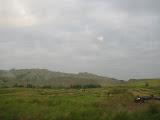 Early morning walks with papa at the pacific side of Leyte.
Early morning walks with papa at the pacific side of Leyte.Little did I know that summer of 2009 would be the last series of walks I would have with papa before his stroke last July. I am truly grateful for his passion for the serene beach of Tolosa that makes us spend most of our vacation hours there rather than inside the secure and comforts of home. We practically grew up along that beach.
Little did I know, too, that those walks would make me become more aware of the moods of the pacific ocean that is calm in the morning, moderate in the afternoon and turbulent at night.
When Orvill Raines wrote about his impressions of the early morning mood of the pacific in Leyte, he never knew that the few marvelous glimpses of the calm pacific would just be a fleeting moment in his life as he would later fall victim of an air attack in 1945. The way he described it made me feel I was actually looking at what he was seeing that time.
Orvill wrote about the calmness of the early morning pacific in one of his letters to his wife which is now compiled into a book titled Good Night Officially. He spoke of the pacific as something that looks like a mirror in the morning, very pacifying. No wonder it is called Pacific.
 When I came to know that through Orvill, I became more aware of the moods of the pacific that I would often just sit on the fine sand and watch it especially in early mornings and late afternoons. Images of naval fleets darkening the horizon, the bloody beach of 1945, the campsite of the American troops, people waving happily at those foreigners who freed them, my mama (in her early childhood years then) and her sisters hoarding chocolates given out by the troops, especially from someone called Dale Thornton, one of the American soldiers serving in Tolosa, Leyte, would come alive as I linger at the seaside. Somehow spending quiet moments at the beach of Tolosa brings me back to those people who struggled for freedom, living uncomplicated lives and being very much grateful to those who have helped them.
When I came to know that through Orvill, I became more aware of the moods of the pacific that I would often just sit on the fine sand and watch it especially in early mornings and late afternoons. Images of naval fleets darkening the horizon, the bloody beach of 1945, the campsite of the American troops, people waving happily at those foreigners who freed them, my mama (in her early childhood years then) and her sisters hoarding chocolates given out by the troops, especially from someone called Dale Thornton, one of the American soldiers serving in Tolosa, Leyte, would come alive as I linger at the seaside. Somehow spending quiet moments at the beach of Tolosa brings me back to those people who struggled for freedom, living uncomplicated lives and being very much grateful to those who have helped them.This may seem late but I would like to thank Mr. Thornton for taking care of mama especially at that time when she was very sick. We really do not know much about him but mama's fond memories of him gives a picture of a kind person who missed his family, especially his sister who seemed to resemble mama at that time. Most probably he may be dead by now but still we extend our gratitude to him for his kindness. He's a true hero for us. Thank you.
Daghang salamat.
Labels: Tolosa
Labels: flowers


These pictures were taken from inside the bus while going to Tabuk, Kalinga. Kalinga is a northern province of the Philippines that is known for its rice terraces. Even if we did not go to the rice terraces, we got to taste its organic brown rice that was locally grown and manually milled.
Kalinga in tagalog refers to caring like how a good parent takes care of a child. Its meaning is so endearing that its root word was adapted to name a government center that caters to the problem or problematic Filipino youth: Lingap.
Growing up with this definition of kalinga, it may come as a surprise to you that the meaning of kalinga (pronounced as kaling-ga) in the mountain province means the exact opposite. It refers to head hunters.
 The people in the northern province of Luzon used to be warring tribes that went after each other's heads, literally. For this, the Igorots, who were enemies of the Kalingas gave them that name.
The people in the northern province of Luzon used to be warring tribes that went after each other's heads, literally. For this, the Igorots, who were enemies of the Kalingas gave them that name.So, kalinga up north means head takers, while kalinga down south means "head keepers."
Subscribe to:
Comments (Atom)







